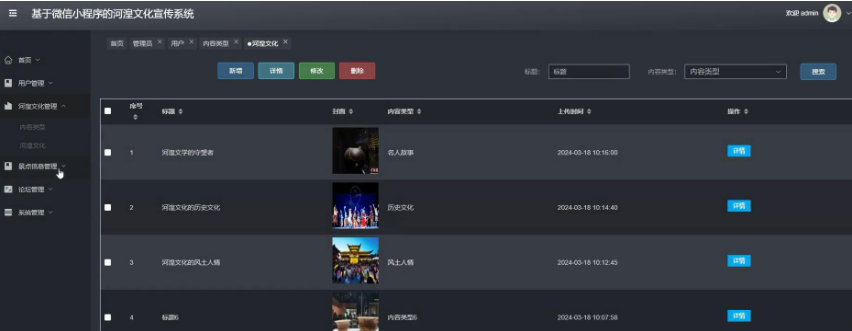- springcloud feign调用get请求变成了post请求解决
只想要搞钱
springcloudjavaspring
1.feign调用get请求,feignService定义的get请求的参数是一个对象,如下图,调用另一个服务时,提示405,变成了post请求@GetMapping("/trainContact/queryContactForCurrentUser")Result>queryContactForCurrentUser(TrainContactPageDTOpageDTO);2.解决,对象前加一个
- FastAPI如何玩转安全防护,让黑客望而却步?
url:/posts/c1314c623211c9269f36053179a53d5c/title:FastAPI如何玩转安全防护,让黑客望而却步?date:2025-07-04T18:28:43+08:00lastmod:2025-07-04T18:28:43+08:00author:cmdragonsummary:FastAPI通过内置的OAuth2和JWT支持,提供了开箱即用的安全解决方案,
- 鸿蒙开发进阶(HarmonyOS )开发ArkTS卡片页面
凹~凸~曼
HarmonyOS鸿蒙开发OpenHarmonyharmonyos华为鸿蒙系统前端androidui移动开发
鸿蒙NEXT开发实战往期必看文章:一分钟了解”纯血版!鸿蒙HarmonyOSNext应用开发!“非常详细的”鸿蒙HarmonyOSNext应用开发学习路线!(从零基础入门到精通)HarmonyOSNEXT应用开发案例实践总结合(持续更新......)HarmonyOSNEXT应用开发性能优化实践总结(持续更新......)开发者可以使用声明式范式开发ArkTS卡片页面。如下卡片页面由DevEcoS
- 智能产线05期-实时监控:SCADA系统驱动的可视化智能工厂
TYMII_
智能产线自动化设备物联网WMS系统
在智能制造快速发展的背景下,传统人工巡检和事后处理的监控方式已无法满足现代工厂对实时性、预测性和可视化的要求。当前生产监控面临以下痛点:各系统数据孤岛:SCADA、MES、WMS系统数据不互通监控维度单一:仅关注设备状态,缺乏生产与物料协同响应机制割裂:设备异常与生产调度、物料供应脱节决策依据不足:缺少跨系统的综合分析数据一、系统总体架构太米智能实时监控系统采用"数据采集-监控分析-决策执行"三层
- 牛客_编辑距离(二)
d3y1
java
编辑距离(二)https://www.nowcoder.com/practice/05fed41805ae4394ab6607d0d745c8e4importjava.util.*;/***NC35编辑距离(二)*@authord3y1*/publicclassSolution{/***代码中的类名、方法名、参数名已经指定,请勿修改,直接返回方法规定的值即可**mineditcost*@param
- Ubuntu18.04中默认的软件源sources.list
AlwaysSimple
ubuntu
文件位置:etc/apt/sources.list#debcdrom:[Ubuntu18.04.3LTS_BionicBeaver_-Releaseamd64(20190805)]/bionicmainrestricted#Seehttp://help.ubuntu.com/community/UpgradeNotesforhowtoupgradeto#newerversionsofthedist
- java枚举 数字_java 枚举
Java中枚举的线程安全性及序列化问题--枚举是如何保证线程安全的要想看源码,首先得有一个类吧,那么枚举类型到底是什么类呢?是enum吗?答案很明显不是,enum就和class一样,只是一个关键字,他并不是一个类,那么枚举是由什么类维护的呢,我们简单的写一个枚举:然后我们使用反编译,看看这段代码到底是怎么实现的,反编...文章java填坑路2018-08-051238浏览量Java基础15:深入剖
- Debian安装配置Nvidia驱动
两斤半
LinuxDebiandebian
检查内核模块nvidia-smi检查已加载的内核模块lsmod|grepnvidia#输出参考nvidia_uvm49152000nvidia_drm11878418drm_ttm_helper163841nvidia_drmdrm_kms_helper2539522drm_ttm_helper,nvidia_drmnvidia_modeset160563225nvidia_drmnvidia60
- 打造基于51单片机的音乐播放器
红廉骑士兽
本文还有配套的精品资源,点击获取简介:本文详细介绍了如何利用51单片机构建一个简易音乐播放器的全过程。51单片机是8051系列成员之一,具备处理控制任务的能力,包括音频播放。文章将指导读者通过设计核心模块,如存储介质扩展、音乐解码、音频放大输出、用户界面交互、控制逻辑编程、电源管理和设备调试测试等步骤,来理解嵌入式系统设计的各个方面。1.51单片机基础介绍简介51单片机是一种经典的微控制器,广泛应
- Linux基础IO——文件系统与动静态库
栖林_
Linuxlinux运维服务器
文章目录什么是文件系统磁盘的物理结构扇区中的块组软硬链接硬链接软连接动静态库生成静态库使用静态库生成动态库使用动态库什么是文件系统我们之前所说的文件读写都是通过进程对已经打开的文件进行操作,也就是对操作系统对文件所创建的结构体进行操作那么对于磁盘中没有打开的文件是如何进行管理的磁盘的物理结构这里我们主要讨论机械磁盘而非固态磁盘,因为机械磁盘的价格较低,而且学习之后也能更好的理解整个系统这是机械硬盘
- python内置函数reversed_python必备内置函数- reversed(seq)
weixin_39923599
python必备内置函数-abs()https://developer.aliyun.com/ask/280547python必备内置函数-all()https://developer.aliyun.com/ask/280560python必备内置函数-any()https://developer.aliyun.com/ask/280561python必备内置函数-ascii()https://d
- 手把手实现RPC框架--简易版Dubbo构造(四)服务端线程池处理请求 反射调用
”PANDA
JAVArpcdubbojava
本节commit源码地址:11e4aca服务端实现--反射调用服务端如果收到请求就创建一个线程来处理调用,利用线程池创建线程,对多线程情况进行处理(Java线程池学习请戳:https://blog.csdn.net/suifeng3051/article/details/49443835)publicclassRpcServer{privatefinalExecutorServicethreadP
- 【字节跳动】数据挖掘面试题0005:在旋转有序数组中查找是否存在元素key
言析数智
数据挖掘常见面试题算法面试题数据挖掘二分查找法
文章大纲方法思路代码解释问题场景:在“打乱”的有序数组里找数核心思路:每次排除一半可能性分步骤找数(以数组[7,8,9,10,1,2,3]为例,找数字10)再举个反例:找数字5(数组中没有)用“左右有序”的逻辑来总结代码的“人话”翻译为什么时间复杂度是O(logn)?要在旋转后的有序数组中以O(logn)时间复杂度查找元素,可利用二分查找的变体。关键在于确定哪一半数组仍然有序,并判断目标值是否在该
- GraphRAG革命性突破!美国Cedars-Sinai医疗中心揭秘:知识增强大模型如何重塑阿尔茨海默病基因研究与治疗?
DeepSeek-大模型系统教程
人工智能大模型chatgpt语言模型ai大模型学习大模型教程
摘要:随着阿尔茨海默病患者人数不断攀升,Cedars-Sinai医学中心通过知识图谱和AI技术,打造了AlzKB阿尔茨海默病知识库,用以推动新型病因和药物的发现。本文详解这些前沿工具如何结合,赋能专业人士实现高效科研转化,为认知障碍领域带来突破正文据估计,690万65岁及以上的美国人患有阿尔茨海默病。如果没有重大的医学突破,预计到2060年,美国这一数字将上升到1380万,到2050年全球将上升到
- 构建swoole docker镜像(基于alpine基础镜像)
这里默认你已经安装好docker,并准备好以下环境一.环境Ubuntu18.04.1LTSphp:7.2.4-cli-alpine3.7(https://hub.docker.com/_/php/拉取)swoole-4.2.1(https://pecl.php.net/package/swoole下载)dockerversion$dockerversionClient:Version:18.05.
- 新互联经济时代企业营销模式变革研讨会召开
xvgpjnhc
企业美团网用友软件解决方案京东
据悉,北京大学和用友公司联合成立的营销模式变革研究课题组于2014年6月17日,在用友软件(600588,股吧)园成功举办了“新互联经济时代企业营销模式变革研讨会”。此次研讨会聚集了业内专家、学者、行业媒体专家20余人,共同探讨新互联网经济时代,企业营销模式变革的话题。本次研讨会嘉宾阵容强大,有来自北京大学专家教授、京东、京客隆、易果生鲜、IT经理世界、光明网、美团网、第三方研究机构专家代表,以及
- python+uniapp基于微信小程序的河湟文化宣传系统nodejs+java
文章目录具体实现截图本项目源码获取详细视频演示:文章底部获取博主联系方式!!!!本系统开发思路进度安排及各阶段主要任务java类核心代码部分展示主要参考文献:源码获取/详细视频演示##项目介绍摘要随着互联网技术的飞速发展和移动互联网的
- 51单片机:电脑闹钟项目实战课程实例
王大帅爱钢炼
本文还有配套的精品资源,点击获取简介:51单片机是微控制器领域的基石,尤其适用于教学和初学者的实践。本课程实例聚焦于创建一个带音乐功能的电脑闹钟,涉及硬件设计、软件编程和实际应用。学习者将通过这个实例深入理解51单片机的工作原理,掌握时钟电路和音乐播放模块的使用,并学习如何编写程序来控制这些硬件组件。1.51单片机基础概念与应用1.151单片机的概述51单片机,也被称为8051微控制器,是一种经典
- 【DeepSeek开发入门】DeepSeek API 开发初体验
寻道AI小兵
人工智能语言模型AIGCAI编程
系列篇章No.文章01【DeepSeek应用实践】DeepSeek接入Word、WPS方法详解:无需代码,轻松实现智能办公助手功能02【DeepSeek应用实践】通义灵码+DeepSeek:AI编程助手的实战指南03【DeepSeek应用实践】Cline集成DeepSeek:开源AI编程助手,终端与Web开发的超强助力04【DeepSeek开发入门】DeepSeekAPI开发初体验05【DeepS
- 【算法刷题记录001】整型数组合并(java代码实现)
一、题目描述对于给定的由n个整数组成的数组{a1,a2,…,an}和m个整数组成的数组{b1,b2,…,bm},将它们合并后从小到大排序,并输出去重后的结果。二、输入描述第一行输入一个整数n(1≤n≤150)代表数组a中元素个数。第二行输入n个整数a1,a2,…,an(-1≤ai≤105)代表数组a中的元素。第三行输入一个整数m(1≤m≤150)代表数组b中元素个数。第四行输入m个整数b1,b2,
- 鸿蒙开发进阶(HarmonyOS)相机拍照功能(ArkTS)
鸿蒙NEXT开发实战往期必看文章:一分钟了解”纯血版!鸿蒙HarmonyOSNext应用开发!“非常详细的”鸿蒙HarmonyOSNext应用开发学习路线!(从零基础入门到精通)HarmonyOSNEXT应用开发案例实践总结合(持续更新......)HarmonyOSNEXT应用开发性能优化实践总结(持续更新......)拍照是相机的最重要功能之一,拍照模块基于相机复杂的逻辑,为了保证用户拍出的照
- 鸿蒙开发进阶(HarmonyOS )应用账号密码更新保存
凹~凸~曼
鸿蒙开发HarmonyOSOpenHarmonyharmonyos华为前端android鸿蒙系统ui移动开发
鸿蒙NEXT开发实战往期必看文章:一分钟了解”纯血版!鸿蒙HarmonyOSNext应用开发!“非常详细的”鸿蒙HarmonyOSNext应用开发学习路线!(从零基础入门到精通)HarmonyOSNEXT应用开发案例实践总结合(持续更新......)HarmonyOSNEXT应用开发性能优化实践总结(持续更新......)密码保险箱在应用的登录、注册、修改密码等场景具备自动保存用户名和密码的能力。
- 鸿蒙HarmonyOS (开发进阶)图形锁屏案例实践
取什么名字好呢~
OpenHarmony鸿蒙开发HarmonyOSharmonyos华为1024程序员节前端鸿蒙androidui
鸿蒙NEXT开发实战往期必看文章:一分钟了解”纯血版!鸿蒙HarmonyOSNext应用开发!“非常详细的”鸿蒙HarmonyOSNext应用开发学习路线!(从零基础入门到精通)HarmonyOSNEXT应用开发案例实践总结合(持续更新......)
- KNN(K-近邻算法)(上)--day05
扫把星133
机器学习python人工智能近邻算法算法
KNN(K-NearestNeighbors,K近邻算法)是一种用于分类和回归的非参数化方法。其基本思想是通过找出与新样本最接近的已标记数据中的K个最近邻居来进行预测或分类。注释:非参数化方法是指在统计学和机器学习中,不对数据分布做出严格假设(这些假设通常包括
- RT‑DETR 系列发展时间顺序
要努力啊啊啊
计算机视觉深度学习计算机视觉目标检测人工智能
RT‑DETR系列发展时间顺序RT‑DETR系列是由百度提出的一系列基于Transformer的实时端到端目标检测器,以下列出了从提出到演化的主要milestone:时间线概览版本时间主要改进/特点DETR2020–05(论文)oai_citation:0‡labellerr.comoai_citation:1‡arxiv.orgTransformer架构首次用于端到端检测,无需NMSRT‑DET
- STM32控制四自由度机械臂(SG90舵机)(硬件篇)(简单易复刻)
1.前期硬件准备2s锂电池一个(用于供电),stm32f103c8t6最小系统板一个(主控板),两个摇杆(用于摇杆模式),四个电位器(用于示教器模式),一个蓝牙hc-05(用于蓝牙模式已经串口打印信息方便调试),一个oled显示屏(用于显示信息,也是方便调试),以及最主要的由四个sg90舵机组成的四自由度机械臂(因为我没有3d打印机,故直接在淘宝买了一个现成的,只需要买机械臂,不用带控制板,几十块
- python打卡day58@浙大疏锦行
风逸hhh
python打卡60天行动python开发语言
知识点回顾:时序建模的流程时序任务经典单变量数据集ARIMA(p,d,q)模型实战SARIMA摘要图的理解处理不平稳的2种差分n阶差分---处理趋势季节性差分---处理季节性建立一个ARIMA模型,通常遵循以下步骤:1.数据可视化:观察原始时间序列图,判断是否存在趋势或季节性。2.平稳性检验:-对原始序列进行ADF检验。-如果p值>0.05,说明序列非平稳,需要进行差分。3.确定差分次数d:-进行
- 洛谷刷题8
eurotruck
c++算法图论洛谷刷题
B2051点和正方形的关系B2051点和正方形的关系-洛谷难度:入门如果x1||y1,那么点就在正方形外,反之亦然AC代码:#includeusingnamespacestd;intmain(){#defineintlonglongintx,y;cin>>x>>y;if(x>=-1&&xusingnamespacestd;intmain(){intm,n;cin>>m;cin>>n;intr=0;
- OSEK标准ISO_17356汇总介绍
汽车电子助手
ISO标准嵌入式硬件
目录ISO17356-1:2005Part1:Generalstructureandterms,definitionsandabbreviatedtermsISO17356-2:2005Part2:OSEK/VDXspecificationsforbindingOS,COMandNMISO17356-3:2005Part3:OSEK/VDXOperatingSystem(OS)ISO17356-4
- 前端项目3-02:登录页面
航Hang*
webstorm前端项目前端csscss3htmlhtml5
一、效果图二、全部代码码农魔盒body{background:linear-gradient(toright,#65CBF7,#B3A5FC);width:100vw;height:100vh;margin:0;}.box{width:60%;height:450px;box-shadow:05px15pxrgba(0,0,0,.8);display:flex;position:fixed;top
- jQuery 跨域访问的三种方式 No 'Access-Control-Allow-Origin' header is present on the reque
qiaolevip
每天进步一点点学习永无止境跨域众观千象
XMLHttpRequest cannot load http://v.xxx.com. No 'Access-Control-Allow-Origin' header is present on the requested resource. Origin 'http://localhost:63342' is therefore not allowed access. test.html:1
- mysql 分区查询优化
annan211
java分区优化mysql
分区查询优化
引入分区可以给查询带来一定的优势,但同时也会引入一些bug.
分区最大的优点就是优化器可以根据分区函数来过滤掉一些分区,通过分区过滤可以让查询扫描更少的数据。
所以,对于访问分区表来说,很重要的一点是要在where 条件中带入分区,让优化器过滤掉无需访问的分区。
可以通过查看explain执行计划,是否携带 partitions
- MYSQL存储过程中使用游标
chicony
Mysql存储过程
DELIMITER $$
DROP PROCEDURE IF EXISTS getUserInfo $$
CREATE PROCEDURE getUserInfo(in date_day datetime)-- -- 实例-- 存储过程名为:getUserInfo-- 参数为:date_day日期格式:2008-03-08-- BEGINdecla
- mysql 和 sqlite 区别
Array_06
sqlite
转载:
http://www.cnblogs.com/ygm900/p/3460663.html
mysql 和 sqlite 区别
SQLITE是单机数据库。功能简约,小型化,追求最大磁盘效率
MYSQL是完善的服务器数据库。功能全面,综合化,追求最大并发效率
MYSQL、Sybase、Oracle等这些都是试用于服务器数据量大功能多需要安装,例如网站访问量比较大的。而sq
- pinyin4j使用
oloz
pinyin4j
首先需要pinyin4j的jar包支持;jar包已上传至附件内
方法一:把汉字转换为拼音;例如:编程转换后则为biancheng
/**
* 将汉字转换为全拼
* @param src 你的需要转换的汉字
* @param isUPPERCASE 是否转换为大写的拼音; true:转换为大写;fal
- 微博发送私信
随意而生
微博
在前面文章中说了如和获取登陆时候所需要的cookie,现在只要拿到最后登陆所需要的cookie,然后抓包分析一下微博私信发送界面
http://weibo.com/message/history?uid=****&name=****
可以发现其发送提交的Post请求和其中的数据,
让后用程序模拟发送POST请求中的数据,带着cookie发送到私信的接入口,就可以实现发私信的功能了。
- jsp
香水浓
jsp
JSP初始化
容器载入JSP文件后,它会在为请求提供任何服务前调用jspInit()方法。如果您需要执行自定义的JSP初始化任务,复写jspInit()方法就行了
JSP执行
这一阶段描述了JSP生命周期中一切与请求相关的交互行为,直到被销毁。
当JSP网页完成初始化后
- 在 Windows 上安装 SVN Subversion 服务端
AdyZhang
SVN
在 Windows 上安装 SVN Subversion 服务端2009-09-16高宏伟哈尔滨市道里区通达街291号
最佳阅读效果请访问原地址:http://blog.donews.com/dukejoe/archive/2009/09/16/1560917.aspx
现在的Subversion已经足够稳定,而且已经进入了它的黄金时段。我们看到大量的项目都在使
- android开发中如何使用 alertDialog从listView中删除数据?
aijuans
android
我现在使用listView展示了很多的配置信息,我现在想在点击其中一条的时候填出 alertDialog,点击确认后就删除该条数据,( ArrayAdapter ,ArrayList,listView 全部删除),我知道在 下面的onItemLongClick 方法中 参数 arg2 是选中的序号,但是我不知道如何继续处理下去 1 2 3
- jdk-6u26-linux-x64.bin 安装
baalwolf
linux
1.上传安装文件(jdk-6u26-linux-x64.bin)
2.修改权限
[root@localhost ~]# ls -l /usr/local/jdk-6u26-linux-x64.bin
3.执行安装文件
[root@localhost ~]# cd /usr/local
[root@localhost local]# ./jdk-6u26-linux-x64.bin&nbs
- MongoDB经典面试题集锦
BigBird2012
mongodb
1.什么是NoSQL数据库?NoSQL和RDBMS有什么区别?在哪些情况下使用和不使用NoSQL数据库?
NoSQL是非关系型数据库,NoSQL = Not Only SQL。
关系型数据库采用的结构化的数据,NoSQL采用的是键值对的方式存储数据。
在处理非结构化/半结构化的大数据时;在水平方向上进行扩展时;随时应对动态增加的数据项时可以优先考虑使用NoSQL数据库。
在考虑数据库的成熟
- JavaScript异步编程Promise模式的6个特性
bijian1013
JavaScriptPromise
Promise是一个非常有价值的构造器,能够帮助你避免使用镶套匿名方法,而使用更具有可读性的方式组装异步代码。这里我们将介绍6个最简单的特性。
在我们开始正式介绍之前,我们想看看Javascript Promise的样子:
var p = new Promise(function(r
- [Zookeeper学习笔记之八]Zookeeper源代码分析之Zookeeper.ZKWatchManager
bit1129
zookeeper
ClientWatchManager接口
//接口的唯一方法materialize用于确定那些Watcher需要被通知
//确定Watcher需要三方面的因素1.事件状态 2.事件类型 3.znode的path
public interface ClientWatchManager {
/**
* Return a set of watchers that should
- 【Scala十五】Scala核心九:隐式转换之二
bit1129
scala
隐式转换存在的必要性,
在Java Swing中,按钮点击事件的处理,转换为Scala的的写法如下:
val button = new JButton
button.addActionListener(
new ActionListener {
def actionPerformed(event: ActionEvent) {
- Android JSON数据的解析与封装小Demo
ronin47
转自:http://www.open-open.com/lib/view/open1420529336406.html
package com.example.jsondemo;
import org.json.JSONArray;
import org.json.JSONException;
import org.json.JSONObject;
impor
- [设计]字体创意设计方法谈
brotherlamp
UIui自学ui视频ui教程ui资料
从古至今,文字在我们的生活中是必不可少的事物,我们不能想象没有文字的世界将会是怎样。在平面设计中,UI设计师在文字上所花的心思和功夫最多,因为文字能直观地表达UI设计师所的意念。在文字上的创造设计,直接反映出平面作品的主题。
如设计一幅戴尔笔记本电脑的广告海报,假设海报上没有出现“戴尔”两个文字,即使放上所有戴尔笔记本电脑的图片都不能让人们得知这些电脑是什么品牌。只要写上“戴尔笔
- 单调队列-用一个长度为k的窗在整数数列上移动,求窗里面所包含的数的最大值
bylijinnan
java算法面试题
import java.util.LinkedList;
/*
单调队列 滑动窗口
单调队列是这样的一个队列:队列里面的元素是有序的,是递增或者递减
题目:给定一个长度为N的整数数列a(i),i=0,1,...,N-1和窗长度k.
要求:f(i) = max{a(i-k+1),a(i-k+2),..., a(i)},i = 0,1,...,N-1
问题的另一种描述就
- struts2处理一个form多个submit
chiangfai
struts2
web应用中,为完成不同工作,一个jsp的form标签可能有多个submit。如下代码:
<s:form action="submit" method="post" namespace="/my">
<s:textfield name="msg" label="叙述:">
- shell查找上个月,陷阱及野路子
chenchao051
shell
date -d "-1 month" +%F
以上这段代码,假如在2012/10/31执行,结果并不会出现你预计的9月份,而是会出现八月份,原因是10月份有31天,9月份30天,所以-1 month在10月份看来要减去31天,所以直接到了8月31日这天,这不靠谱。
野路子解决:假设当天日期大于15号
- mysql导出数据中文乱码问题
daizj
mysql中文乱码导数据
解决mysql导入导出数据乱码问题方法:
1、进入mysql,通过如下命令查看数据库编码方式:
mysql> show variables like 'character_set_%';
+--------------------------+----------------------------------------+
| Variable_name&nbs
- SAE部署Smarty出现:Uncaught exception 'SmartyException' with message 'unable to write
dcj3sjt126com
PHPsmartysae
对于SAE出现的问题:Uncaught exception 'SmartyException' with message 'unable to write file...。
官方给出了详细的FAQ:http://sae.sina.com.cn/?m=faqs&catId=11#show_213
解决方案为:
01
$path
- 《教父》系列台词
dcj3sjt126com
Your love is also your weak point.
你的所爱同时也是你的弱点。
If anything in this life is certain, if history has taught us anything, it is
that you can kill anyone.
不顾家的人永远不可能成为一个真正的男人。 &
- mongodb安装与使用
dyy_gusi
mongo
一.MongoDB安装和启动,widndows和linux基本相同
1.下载数据库,
linux:mongodb-linux-x86_64-ubuntu1404-3.0.3.tgz
2.解压文件,并且放置到合适的位置
tar -vxf mongodb-linux-x86_64-ubun
- Git排除目录
geeksun
git
在Git的版本控制中,可能有些文件是不需要加入控制的,那我们在提交代码时就需要忽略这些文件,下面讲讲应该怎么给Git配置一些忽略规则。
有三种方法可以忽略掉这些文件,这三种方法都能达到目的,只不过适用情景不一样。
1. 针对单一工程排除文件
这种方式会让这个工程的所有修改者在克隆代码的同时,也能克隆到过滤规则,而不用自己再写一份,这就能保证所有修改者应用的都是同一
- Ubuntu 创建开机自启动脚本的方法
hongtoushizi
ubuntu
转载自: http://rongjih.blog.163.com/blog/static/33574461201111504843245/
Ubuntu 创建开机自启动脚本的步骤如下:
1) 将你的启动脚本复制到 /etc/init.d目录下 以下假设你的脚本文件名为 test。
2) 设置脚本文件的权限 $ sudo chmod 755
- 第八章 流量复制/AB测试/协程
jinnianshilongnian
nginxluacoroutine
流量复制
在实际开发中经常涉及到项目的升级,而该升级不能简单的上线就完事了,需要验证该升级是否兼容老的上线,因此可能需要并行运行两个项目一段时间进行数据比对和校验,待没问题后再进行上线。这其实就需要进行流量复制,把流量复制到其他服务器上,一种方式是使用如tcpcopy引流;另外我们还可以使用nginx的HttpLuaModule模块中的ngx.location.capture_multi进行并发
- 电商系统商品表设计
lkl
DROP TABLE IF EXISTS `category`; -- 类目表
/*!40101 SET @saved_cs_client = @@character_set_client */;
/*!40101 SET character_set_client = utf8 */;
CREATE TABLE `category` (
`id` int(11) NOT NUL
- 修改phpMyAdmin导入SQL文件的大小限制
pda158
sqlmysql
用phpMyAdmin导入mysql数据库时,我的10M的
数据库不能导入,提示mysql数据库最大只能导入2M。
phpMyAdmin数据库导入出错: You probably tried to upload too large file. Please refer to documentation for ways to workaround this limit.
- Tomcat性能调优方案
Sobfist
apachejvmtomcat应用服务器
一、操作系统调优
对于操作系统优化来说,是尽可能的增大可使用的内存容量、提高CPU的频率,保证文件系统的读写速率等。经过压力测试验证,在并发连接很多的情况下,CPU的处理能力越强,系统运行速度越快。。
【适用场景】 任何项目。
二、Java虚拟机调优
应该选择SUN的JVM,在满足项目需要的前提下,尽量选用版本较高的JVM,一般来说高版本产品在速度和效率上比低版本会有改进。
J
- SQLServer学习笔记
vipbooks
数据结构xml
1、create database school 创建数据库school
2、drop database school 删除数据库school
3、use school 连接到school数据库,使其成为当前数据库
4、create table class(classID int primary key identity not null)
创建一个名为class的表,其有一